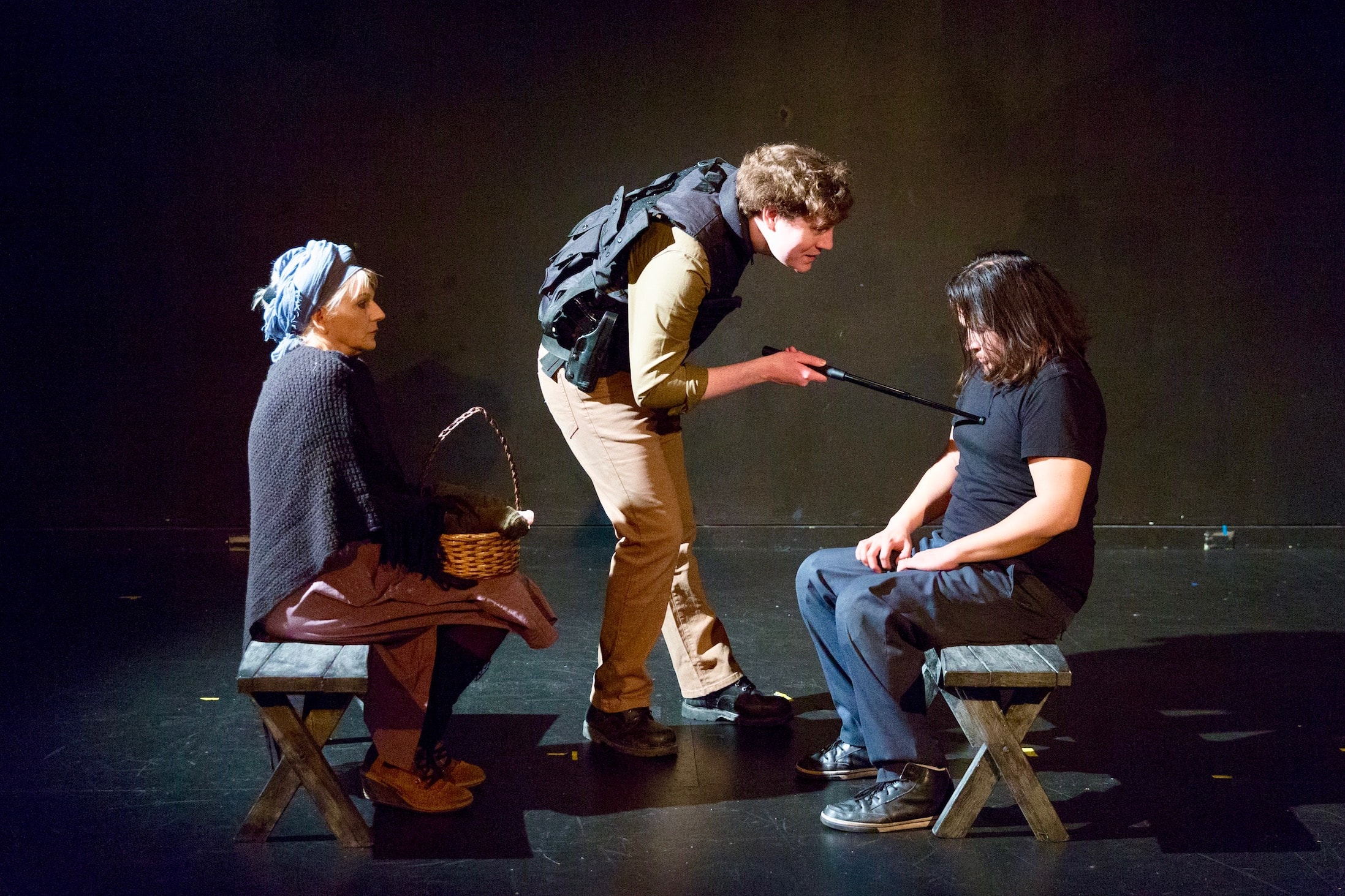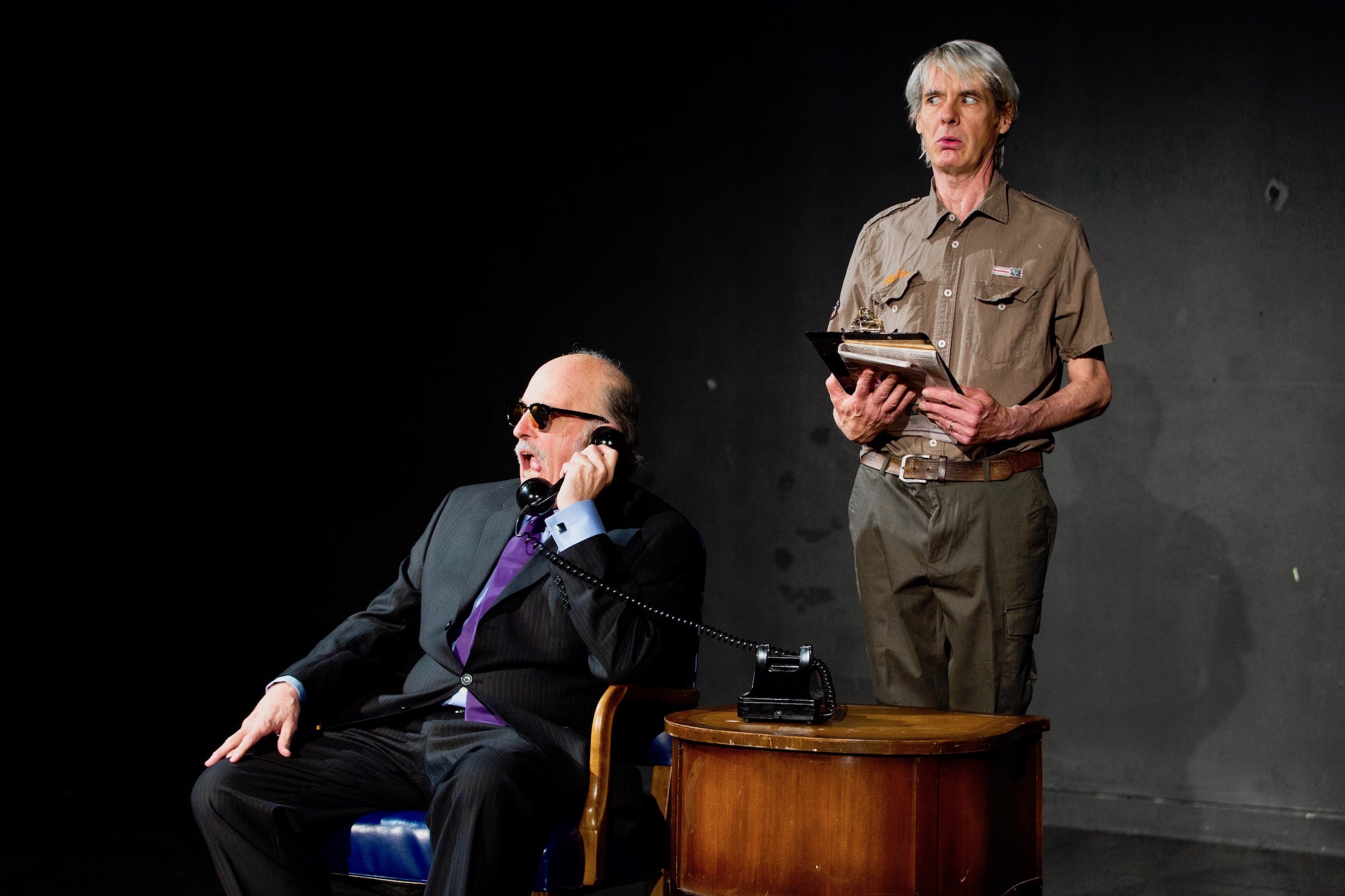When Pinter is performed with precision, with exacting attention to the text—as is the case with Scena Theatre’s razor-sharp Pinter Rep—the effect can be both unnerving and exhilarating. The tension of Pinter’s incessantly menacing language keeps us on tenterhooks, which is of course the point. One does not go to Pinter to unwind.
Four short plays comprise Pinter Rep. Three put the screws on. The last is hilariously unhinged. And Artistic Director Robert McNamara has delivered an appropriately sparse and austere show.
Sound Designer Denise Rose sets the tone with atonal preshow music. Lighting Designer Jonathan Alexander makes scenes dim as befits their darkness. Set Designer John Antone keeps the bare-walled black box the cold world of the plays. Costume Designer Mel Chen evokes with simplicity the power of some characters over the powerlessness of others. We are here for the language, everything seems to say. Pay attention to the text.

In One for the Road, Christopher Henley, playing a wannabe autocrat in some nameless fascist state, brings to the role a wickedly oily wiliness. Nick, as he’s called, takes vicious delight in first interrogating and humiliating a prisoner, then toying with the man’s seven-year-old son, and finally interrogating and humiliating the man’s wife. He does so, he says, for the sake of “god, country, and honor”—a patriotic narrative that emerges in insults and innuendoes interrupted by swigs of whiskey (hence the title). “I love death,” Nick proclaims, “the death of others.” The prisoner whom he assaults verbally is on the verge of tears the whole time, sobbing at the mention of his incarcerated wife; and Robert Sheire plays the role in such palpable pain it is hard to watch. The son, a spritely Cecilia Smith, likes to play airplane and is never harmed, though we fear he will be. And Irina Koval as the persecuted and broken wife gives a performance that is heartbreaking.
Thus are set forth the dramaturgical and political outlines of this brief evening: one character’s sadistic authoritarianism dominating one or more other characters, who suffer their subordination helplessly.

Next up: Mountain Language, in which occupying soldiers in another nameless country torment the indigenous mountain people by refusing them medical care, torturing them, and forbidding them to speak their native language, insisting they speak “the language of the capital.” Henley, Sheire, David Johnson, Greg Ongao are the brown-shirted brutes and Koval, Karin Rosnizeck, Mikey Bevarelli are the three victimized villagers.

In The New World Order, Henley returns bound, blindfolded, and stripped to his skivvies as a prisoner threatened and interrogated by two factotums of another fascist state. This isn’t Nick getting his comeupance; this is yet another demented domination game and Blindfolded Man is but a nameless stooge. What’s amped up from the play before it is that this time the two tyrannizers (Sheire and Ongao) have a lot of jovial male-bondy banter. One calls the other a cunt, for instance, then moments later calls him a prick. It’s got to be one or the other, protests the insultee; cunt and prick are contradictions. Their grim patriotic purpose: “to keep the world clean for democracy.”

The fourth short work is The Pres and An Officer, a play found on a notepad after Pinter’s death and now being given its U.S. premiere. This one’s a fun one. Robert McNamara plays a pompous and addled U.S. president (Pinter passed in 2008 so it’s not You Know Who). The Pres instructs the Officer to carry out some horrific orders that are as laughable as they are plausible. Henley, as the very worried Officer, is a perfect foil to McNamara’s comedically larger-than-life portrayal.
I have not yet mentioned the misogyny that is unmistakable in all but the last play. There’s the insult “fuck pig” hurled by a man to a woman in not one but two of the plays. There’s a man’s crack about how intellectual women have a better “ass wobble.” There’s the men’s laughter at the ridiculous notion that women could have “theological aspirations.” There’s the fact that the wife in the first play has been serially raped by her captors and Nick demands that she tell him how many times. There’s the mountain woman’s plaintive appeal to the men occupying her village, “If I fuck you will everything be alright?”
What makes this Scena production so illuminating—about Pinter’s world and our own—is that the first three plays make graphic how men’s authoritarian obsession with dominance and humiliation of women and other men is joined at the hip with misogyny. It’s not something separable. It’s the DNA of despotism.
So when in the fourth play we come to a cartoon of a president, a psychotic and a bully drunk on his power, we should not be surprised if we are reminded of He Who Grabs Them by the Pussy.
Do see this Scena production of Pinter. It is is not only riveting. It is revelatory.
Running Time: About 70 minutes, with no intermission.
Pinter Rep plays in repertory with Beckett Trio, Part Two through May 5, 2019, presented by Scena Theatre performing at Atlas Performing Arts Center – 1333 H Street NE, Washington, DC. Purchase tickets online.




